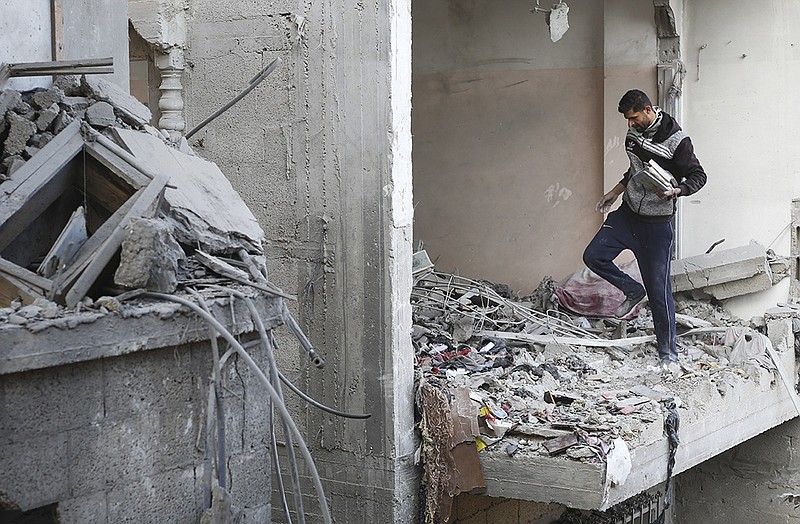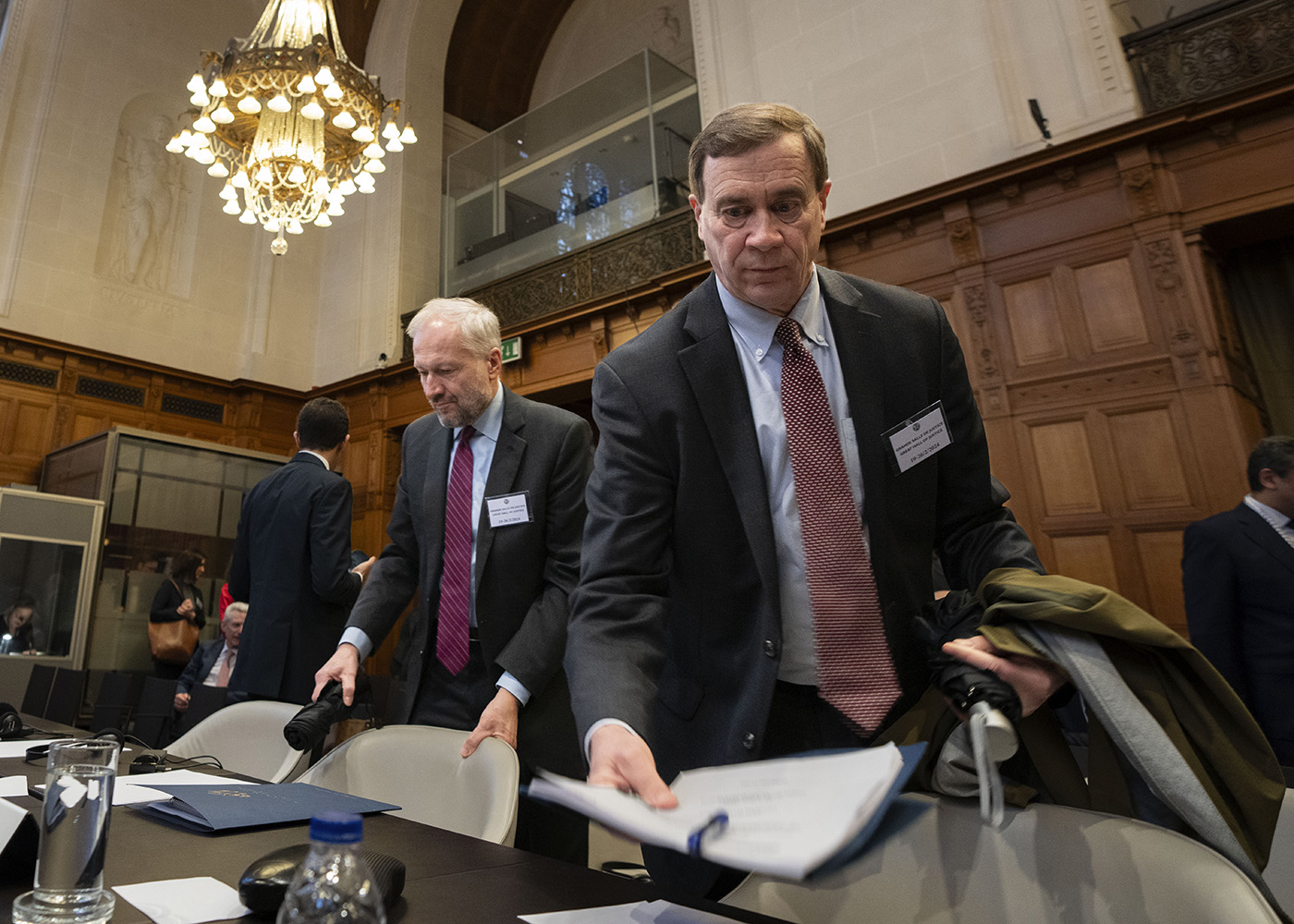A day after vetoing calls for an immediate cease-fire in the Gaza Strip, the United States on Wednesday defended Israel's decades-long occupation of the West Bank and east Jerusalem, arguing at the United Nations' highest court that Israel faced "very real security needs."
The latest U.S. defense of Israel on the global stage came at the International Court of Justice in The Hague, Netherlands, where Richard C. Visek, the acting legal adviser at the U.S. State Department, urged a 15-judge panel not to call for Israel's immediate withdrawal from occupied Palestinian territory. He said that only the establishment of an independent Palestinian state alongside Israel could bring about lasting peace, repeating a long-standing U.S. position but one whose prospects appear even more elusive amid the war in Gaza.
Visek said the panel should not seek to resolve the decades-long Israeli-Palestinian conflict "through an advisory opinion addressed to questions focusing on the acts of only one party."
Visek spoke on the third day of hearings at the court into a request by the General Assembly for a non-binding advisory opinion on the legality of Israel's policies in the occupied territories.
He added that the court's opinion "will have consequences for the parties to the conflict and for the ongoing efforts of all of those working to achieve a durable peace."
The court is hearing six days of arguments over the legality of Israel's occupation of Palestinian-majority territories, including the West Bank and east Jerusalem, which has been the subject of years of debates and resolutions at the U.N. The hearings were called long before Israel went to war against Hamas in Gaza, but have become part of a concerted global effort to stop the conflict and examine the legality of Israel's policies toward Palestinians.
Israel has said it would not participate in the hearings. In a written submission filed last year, Israel argued that the questions put to the court are prejudiced, ignore "Israel's right and duty to protect its citizens," fail to address Israeli security concerns or acknowledge past agreements with the Palestinians to negotiate "the permanent status of the territory, security arrangements, settlements, and borders."
The United States has strongly defended Israel during the war, including Tuesday, when it cast the lone veto against a U.N. Security Council resolution that called for an immediate cease-fire, saying it would disrupt efforts to free hostages held in Gaza.
The vote in the 15-member Security Council was 13-1, with the United Kingdom abstaining. It reflected the strong support from countries around the globe for ending the war, which started when Hamas militants invaded southern Israel on Oct. 7, killing about 1,200 people and taking nearly 250 others hostage. Since then, more than 29,000 Palestinians have been killed in Israel's retaliatory military offensive, according to the Gaza Health Ministry, which says the vast majority were women and children.
"Hamas's attacks, hostage-taking and other atrocities, the ongoing hostilities and the suffering of Palestinians in Gaza and the violence in the West Bank reinforce the United States resolve to urgently achieve a final peace that includes the full realization of Palestinian self-determination," Visek said.
Visek's comments were preceded Wednesday by condemnations of Israel's policies by representatives of Colombia, Cuba and Egypt. Along with the Palestinians, a total of 51 nations and three international organizations are scheduled to speak at the hearings. The court will likely take months to issue its non-binding advisory opinion.
The Palestinians argue that Israel's open-ended military occupation has violated the prohibition on territorial conquest and the Palestinians' right to self-determination, and has imposed a system of racial discrimination and apartheid.
On Wednesday, Visek asked the court to uphold the "established framework" for peace that he said U.N. bodies had agreed to -- one that is contingent on a "broader end to belligerence" against Israel -- rather than to heed calls by other nations for Israel's "unilateral and unconditional withdrawal" from occupied territories.
The Oct. 7 Hamas-led attacks on Israel were a reminder of the threats facing the country and of its security needs, Visek said, "and they persist."
"Regrettably, those needs have been ignored by many of the participants in asserting how the court should consider the questions before it," he said, referring to others countries' testimony in the hearings.
Visek's appearance directly preceded that of Vladimir Tarabrin, Russia's ambassador to the Netherlands.
When he took the microphone, Tarabrin said Russia values its "stable relations" with Israel and expressed condolences over Oct. 7. But in what appeared to be a thinly veiled swipe at the United States, he said Russia "cannot accept the logic" of those who "try to defend the indiscriminate violence against civilians" in Gaza by citing Israel's right to defend itself.
"Violence can only lead to more violence," he said.
The court, which often hears staid disputes among nations, has lately become a venue for countries to oppose Israel. Last month, South Africa argued at the court that Israel was committing genocide against Palestinians in Gaza -- a charge Israel strongly rejected. The judges have not ruled on that claim, but issued an interim order for Israel to take steps to prevent genocide in Gaza.
On Tuesday, South Africa forcefully condemned Israel's policies against Palestinians, calling them "a more extreme form of apartheid," the race-based system of laws that deprived Black South Africans for decades.
Israel has long rejected accusations that it operates an apartheid system, calling such allegations a slur and pointing to what it says is a history of being singled out for condemnation by U.N. bodies and tribunals.
The United States has remained Israel's staunchest defender internationally. But the Biden administration, under increasing pressure from parts of the Democratic Party, has also shown signs of impatience with Israel's conduct of the war, the rising toll in Gaza and the plight of Palestinians under Israeli occupation.
Earlier this week, Palestinian Foreign Minister Riad Malki called on the court to uphold the Palestinian right to self-determination and declare "that the Israeli occupation is illegal and must end immediately, totally and unconditionally."
The idea of land for peace has been the cornerstone of U.S.-led diplomacy for decades and was the basis of the Camp David Accords between Israel and Egypt, in which Israel withdrew from the Sinai Peninsula in return for peace and recognition.
The same principle has been applied to the Israeli-Palestinian conflict, but the peace process has repeatedly stalled because of Palestinian attacks, Israel's expansion of settlements in occupied territory, and the inability of the two sides to agree on thorny issues like final borders, the status of Jerusalem and the fate of Palestinian refugees.
President Joe Biden this month said Israel's military response in Gaza -- which began after Hamas' Oct. 7 attacks -- had been "over the top" and that the immense civilian suffering has "got to stop." The remarks came days after Biden imposed broad financial sanctions against four Israeli men over violent attacks against Palestinians in the West Bank.
After the hearings, which are scheduled to conclude Monday, the court will give an advisory opinion, a decision that is expected to take several months. The opinion will be non-binding.
Information for this article was contributed by Marlise Simons of The New York Times and by Mike Corder of The Associated Press.


